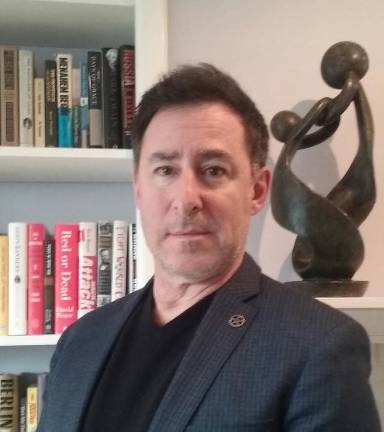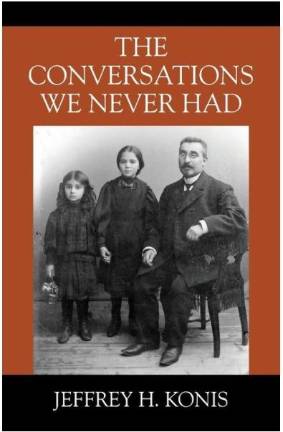Regret leads Jeff Konis to a work of imagination and history


By Ginny Privitar
GOSHEN — It all started three years ago, as Jeff Konis watched "Million Dollar Listing: Los Angeles" on television.
“There was this broker who had a warm, close relationship with his grandmother," said Konis, who lives in Goshen. "She reminded me of my grandmother.”
Both were Holocaust survivors.
“Her mannerisms were similar," he said. "And it hit me that I did not have those conversations with my grandmother. It was very painful.”
It was his inspiration, founded on remorse, for writing “The Conversations We Never Had.”
Conversations about family history — the ones that he, for whatever reason, did not have with his grandmother — were a lost opportunity he grew to regret.
Konis brings his grandmother Olga, called “Ola,” to life with a series of imagined conversations between them. They are anchored by the few facts he knew about her, and his keen recall of her speech, expressions, and quirks, observed while he attended graduate school, when he lived with her.
A family interrupted
Most of us can point to old photos of ancestors about whom we really know very little. Konis’ book is a reminder to ask questions while those who can answer them are still alive.Konis relates what he knows of his family’s history beginning in Vilna, Poland (now Vilnius, Lithuania). His father, Eber, was orphaned at a young age, saved by his former governess during the Third Reich and ultimately raised by his mother’s younger sister, Olga, and her husband, Bonya Kolnichsky. Though not actually his grandmother, she is the “grandmother” he knew.
Eber’s mother, Sonia, died just before the war, when her son was five or six. His father, Efim, was taken and murdered during the war, when Eber was just nine.
After the war he was taken in by his aunt and uncle, who had survived the Nazis' concentration camps. In 1947 the family came to the United States, where Eber Majzel changed his name to Edward Eber Konis, the last a shortened version of Olga and her husband’s last name.
Edward Eber made a great success of his life here, overcoming the language barrier and eventually completing medical school. He was an obstetrician-gynecologist who lived near Port Chester, N.Y., and worked at Bronx-Lebanon and later at Arden Hill Hospital in Goshen. He and his wife, Lisa, had three children. Their son Jeff was born in the Bronx and moved to Monroe with his parents when he was six. Konis attended Monroe-Woodbury High School and SUNY Binghamton, where he obtained a degree in political science.
Olga was recently widowed when Konis went to live with her in Manhattan, as he attended Baruch College Graduate School of Business and Brooklyn Law School for a joint J.D./M.B.A. degree in the 1980s. Between his studies and a young man’s need for diversion, he spent little time with Olga. But he was paying attention, nevertheless.
“I was just telling my son, the best compliment about the book was from my dad," said Konis. "He said he had no idea I knew my grandmother so well.”
It is in the details that Olga is revealed — about her leaving the gas on in the kitchen, his lighting her cigarettes, her predilection for tuna fish and chocolate chip cookies. All are true.
The conversations about family history are drawn from imagination and historical fact.
A new love
Konis started his career practicing law in New York City. He says he “still practices law on the side, if someone asks for help. I enjoy the law, and there are parts of it I miss, but teaching is my love now.”Konis and his wife, Pamela, live in Goshen with their two sons, Alexander, almost 15, and Marc, 11. After Alexander was born, Konis realized that, if he stayed in the law, he would miss him — and, later, Marc — growing up.
"To me, no job was worth this sacrifice," he said. "Talk about avoiding regret!”
In his 40s, Konis attended Fordham University, and, in 2004, received a master’s in education. He now teaches high school social studies at Yorktown High School.
“I also love teenagers and their thirst for life, a feeling that resonates with me so fervently," he said. “I love the kids. The greatest joy is when you reach a kid who comes across as unreachable. It’s never about the grade — it’s about earning the trust of a teenager, who does not give trust so freely, particularly to an adult. When a kid realizes, ‘Wow this adult gets me.’”
When not writing, Konis likes to read, travel, and collect black-and-white fine art photographs. And he describes himself as an obsessive fan of soccer, particularly the Liverpool Football Club. A recent highlight for him was seeing former Liverpool player Steven Gerrard play for the Los Angeles Galaxy at Yankee stadium.
What advice would he give to another new writer who's still trying to get that first book out?
“Any writer is unsure of quality," he said. "Is this worth writing? Is this worth reading?"
He says you should just hunker down and start.
"First write — isolate yourself from everybody," he said. "It’s a solitary process. Show your work to somebody you respect and trust, who will be completely honest with you and not flinch from criticism. You want someone who recognizes that criticism is more valuable than praise.”
What makes a good story?
“Believability,” he said.
“The Conversations We Never Had” is available at barnesandnoble.com and amazon.com. This is Konis’ second book. His first, “From Courtroom to Classroom: Making a Case for Good Teaching,” was self-published in 2008 through Author House.